Welcoming a rescue dog into your family is a wonderful thing to do, but it comes with a great responsibility. As a new pet parent, you want to make sure that your furry friend is happy and healthy. One crucial aspect of canine health is a balanced and nutritious diet that meets their unique needs. This is especially important for rescue dogs, who often have previous health issues or specific dietary requirements due to their prior living situations.
It’s important to note that not all dog foods are created equal, and what works for one dog may not work for another. When it comes to rescued dogs, special diets can be a game-changer. By providing them with food tailored to their individual needs, you can help them maintain a healthy weight, keep their digestive system in check, and address various health conditions.
Throughout this article, we’ll explore the ins and outs of special diets for rescue dogs. You’ll learn about their unique dietary needs, how tailored diets can help promote optimal health, and how to choose the best diet for your four-legged friend. We’ll also cover the key components to include in their meals and how to address common health issues through specialized diets.
With the right approach, you can ensure that your rescue dog gets the nutrients they need to thrive in their new home. So, let’s dive in and unlock the best special diets for rescue dogs today!
Understanding the Dietary Needs of Rescue Dogs
Rescue dogs require proper nutrition to stay healthy and thrive in their new homes. Understanding their dietary needs is crucial for providing them with a well-balanced diet.
When it comes to rescue dog nutrition, their dietary needs may vary depending on several factors. Nutritional requirements for rescued dogs are unique and can be different from those of non-rescued dogs.
Nutritional Requirements for Rescued Dogs
Factors affecting the nutritional requirements of rescued dogs may include:
- The dog’s age
- The dog’s weight and body condition
- Any pre-existing medical conditions
- The dog’s activity level
It’s essential to tailor their diet to their individual needs to ensure they are getting the right nutrients.
Rescue Dog Nutrition
Rescue dogs often have specific dietary needs that require extra attention. Some rescued dogs may have experienced malnourishment, while others may have underlying health issues that require a special diet.
“It’s crucial to work with your veterinarian to determine the best diet for your rescue dog based on their individual needs.”
Avoid feeding your rescue dog table scraps or human food, as it may not provide the necessary nutrients they need. Instead, opt for high-quality dog food that provides complete and balanced nutrition.
Dietary Needs for Rescue Dogs
When selecting a dog food for your rescue dog, consider the following:
- The ingredients in the food and whether they meet your dog’s dietary needs
- Whether the food is designed for your dog’s life stage (puppy, adult, senior)
- Whether the food is designed for your dog’s breed size
- Whether the food meets any specific dietary needs your dog may have (such as a grain-free diet)
Checking with your veterinarian is the best way to ensure you are providing your rescue dog with the right nutrition. They can provide you with recommendations based on your dog’s individual needs, activity level, and overall health.
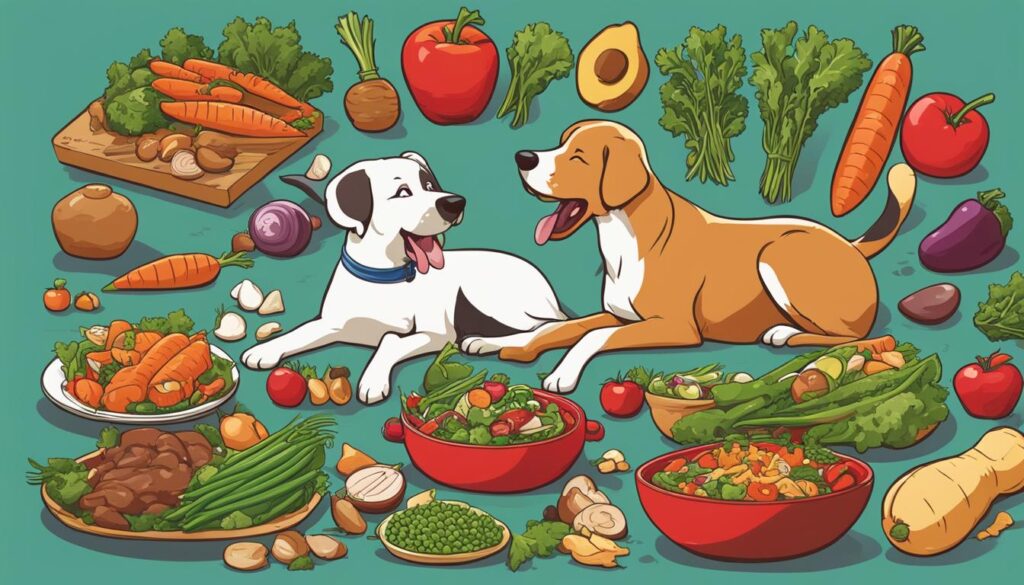

Tailored Diets for Rescued Dogs
Rescued dogs often have unique dietary requirements due to their previous lifestyles or health conditions. While some rescue dogs may have been malnourished or lacked access to proper nutrition, others may have had specific dietary needs due to health conditions or issues.
To ensure your rescued furry friend gets the nutrition they need, it’s important to tailor their diet to their specific needs. Consult with your veterinarian to determine any dietary restrictions or recommendations for your dog.
| Health Issue | Recommended Diet |
|---|---|
| Allergies | A limited ingredient diet that avoids common allergens such as beef, chicken, and grains. |
| Digestive Issues | A diet that is easily digestible, with small, frequent meals and limited ingredient formulas. Probiotics may also be recommended to promote gut health. |
| Weight Management | A low-fat, high-fiber diet with portion control to help your dog reach and maintain a healthy weight. |
| Joint Issues | A diet with added glucosamine, chondroitin, and omega-3 fatty acids to support joint health and mobility. |
Keep in mind that every dog is unique and may have different dietary needs. It’s important to work with your veterinarian to develop a tailored diet plan that meets the specific needs of your rescued dog.
By providing your rescue dog with a well-balanced diet tailored to their individual needs, you can help support their overall health and well-being, making their transition to their forever home as smooth as possible. Don’t forget to check out our tips for choosing the best diet for rescue dogs to help you get started.
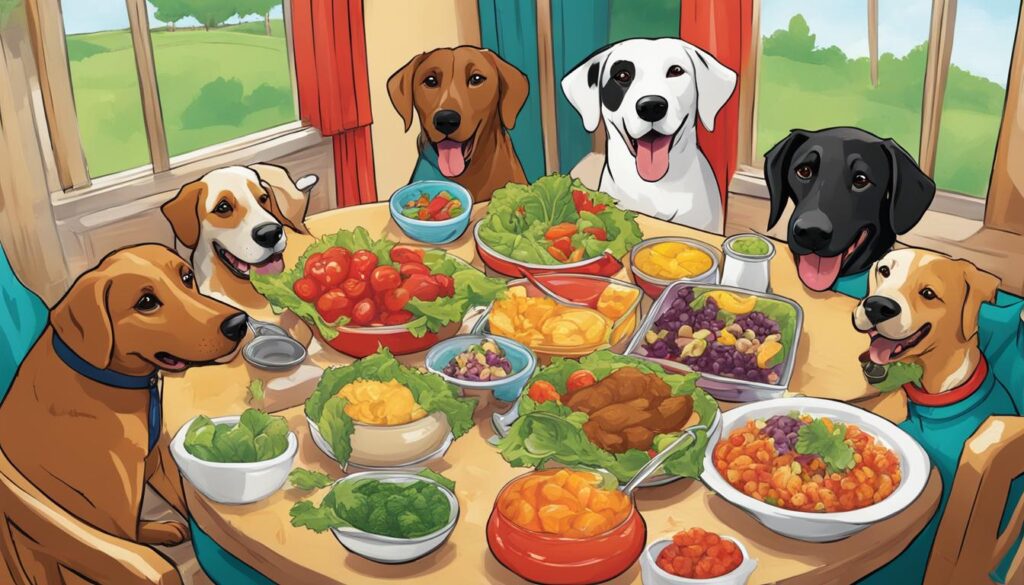

Choosing the Best Diet for Rescue Dogs
Choosing the best diet for your rescue dog can be overwhelming, given the numerous options available. However, making the right choice is crucial to support your furry friend’s transition to their new forever home.
The first step towards selecting the right diet for your dog is to consult with your veterinarian. They can provide guidance on dietary requirements based on your dog’s medical history, age, and activity level.
There are several types of diets to choose from, including:
| Diet Type | Description |
|---|---|
| Commercial Diets | Pre-packaged diets that are nutritionally complete and convenient to serve. |
| Raw Diets | Consist of uncooked meat, organs, and bones, with or without vegetables and fruits. |
| Home-cooked Diets | Prepared based on specific recipes and ingredients, catering to your dog’s unique dietary requirements. |
When selecting the ideal diet for your furry friend, it is essential to choose one that meets their nutritional needs. You should look for a diet that is balanced and contains essential vitamins, minerals, and macronutrients.
Keep in mind that the best diet for your rescue dog may change over time as their needs, activity levels, and health conditions change. Regular check-ups with your veterinarian can help you adjust their diet as needed to ensure optimal health.
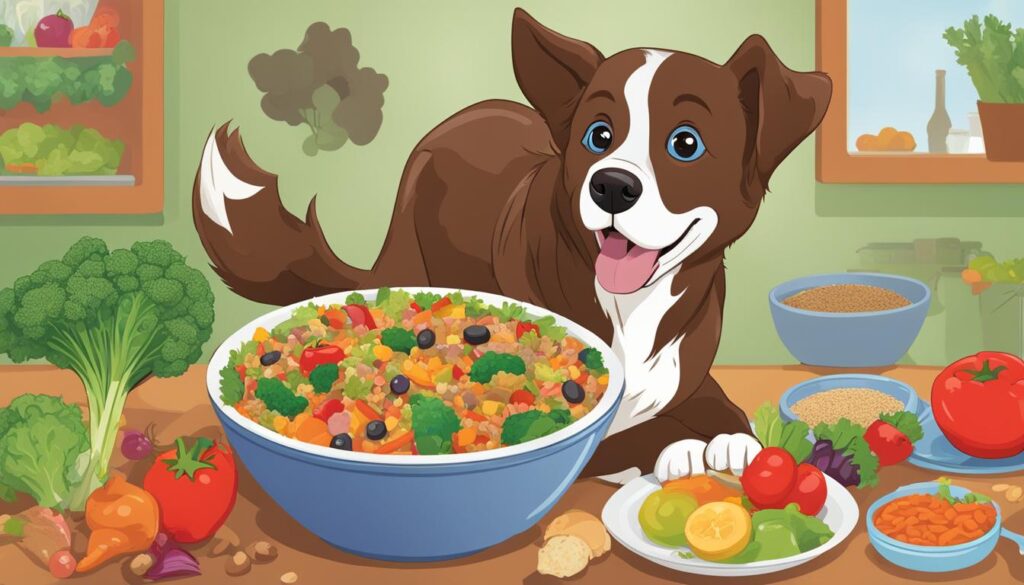

Meeting Nutritional Needs Through Balanced Meals
Creating well-balanced meals is crucial for the overall health of your rescue dog. A balanced diet should include:
- Protein, which aids in building and repairing body tissues
- Carbohydrates, which provide essential energy for physical activity
- Healthy fats, which help absorb essential vitamins and promote healthy skin and coat
- Essential vitamins and minerals, which support overall bodily functions
You can meet your rescue dog’s nutritional needs by incorporating a variety of lean proteins such as chicken, turkey, and fish, along with whole grains like brown rice and quinoa, and nutrient-rich vegetables like sweet potatoes, carrots, and spinach. Choosing high-quality ingredients is key to promoting optimal health and preventing nutritional deficiencies.
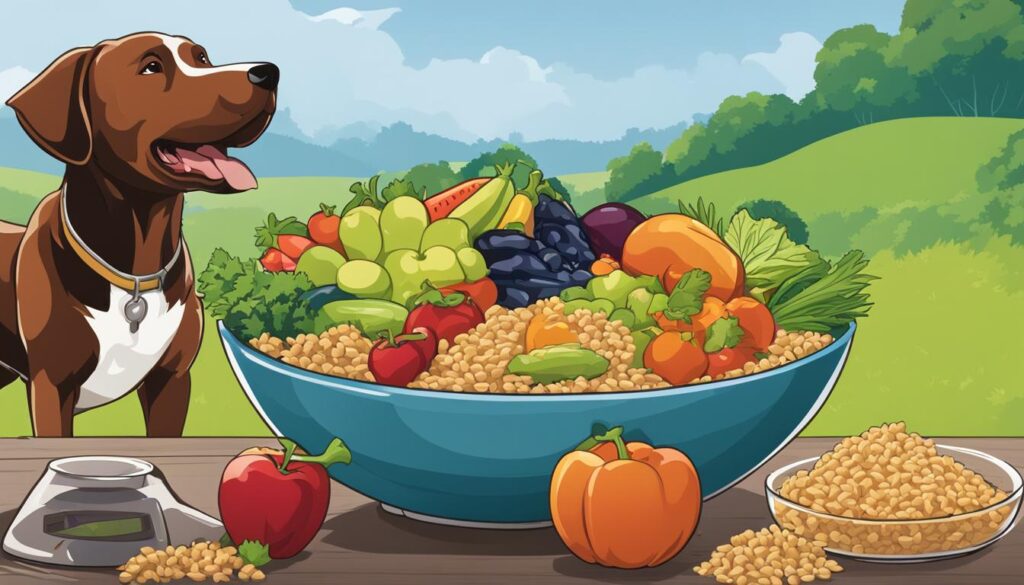

It’s important to note that feeding your rescue dog too much or too little can have adverse effects on their health and lead to obesity or malnourishment. Consult with your veterinarian to determine appropriate serving sizes based on your dog’s age, weight, and activity level. Also, be mindful of any food allergies or sensitivities your rescue dog may have and adjust their diet accordingly.
Addressing Common Health Issues with Special Diets
Your rescue dog may have underlying health issues that can benefit from a special diet. By addressing your dog’s unique dietary needs, you can help manage health problems and improve their quality of life.
“Just like us, dogs’ diets can have a significant impact on their overall health. Feeding a well-balanced diet can help prevent, manage, or even cure certain health issues.”
For dogs with allergies, special diets featuring limited ingredients can help identify and eliminate potential allergens. Similarly, a hypoallergenic diet can stabilize your dog’s immune system and reduce allergy-related symptoms.
Digestive problems, such as diarrhea, constipation, and vomiting, can also be managed through special diets. For example, a high-fiber diet can ease constipation, while a low-residue diet can help manage diarrhea.
If your rescue dog is overweight, a weight management diet can help them shed extra pounds. These diets tend to be low in fat and calories and high in protein, helping your dog feel full and satisfied.
Finally, older dogs or dogs with kidney or heart disease may benefit from a special diet low in protein and sodium. These diets can help slow the progression of these diseases and improve your dog’s quality of life.
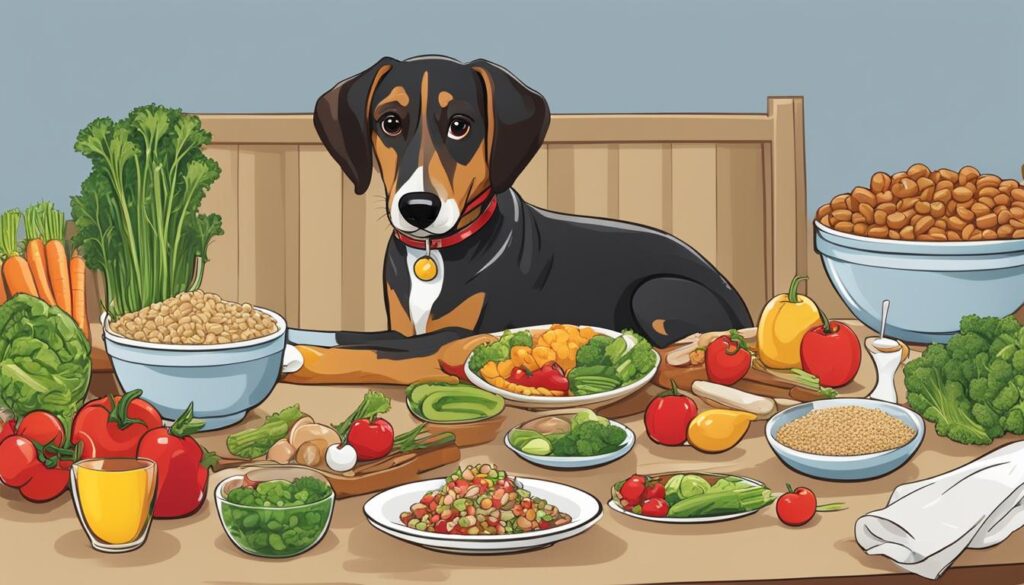

No matter what health issue your rescue dog is facing, consulting with a veterinarian and providing a healthy, well-balanced diet can make a significant impact on their overall health and happiness.
Implementing Special Diets for Rescue Dogs
Transitioning your rescue dog to a special diet can be a challenging journey, but it’s a crucial step in their overall health and well-being. Start by consulting with your veterinarian to determine the best nutritional plan that meets your canine’s specific needs.
Introduce New Foods Slowly
When transitioning your dog to a new diet, introduce new foods slowly. Mix small quantities of the new food with their current diet and gradually increase the proportion over several days. This approach will prevent gastrointestinal upset and ensure a smooth transition.
Establish Feeding Routines
The feeding routine you establish for your rescue dog is an essential factor in their success on a special diet. Feed your dog at the same time every day and avoid feeding them table scraps or treats that may not align with their dietary requirements.
Monitor Your Dog’s Progress
Keep a close eye on your rescue dog’s progress as you transition them to a special diet. Monitor their weight, energy levels, and overall health, and make adjustments to the diet as needed. Regular visits to the veterinarian are also crucial in ensuring that your rescue dog’s nutritional needs are being met.
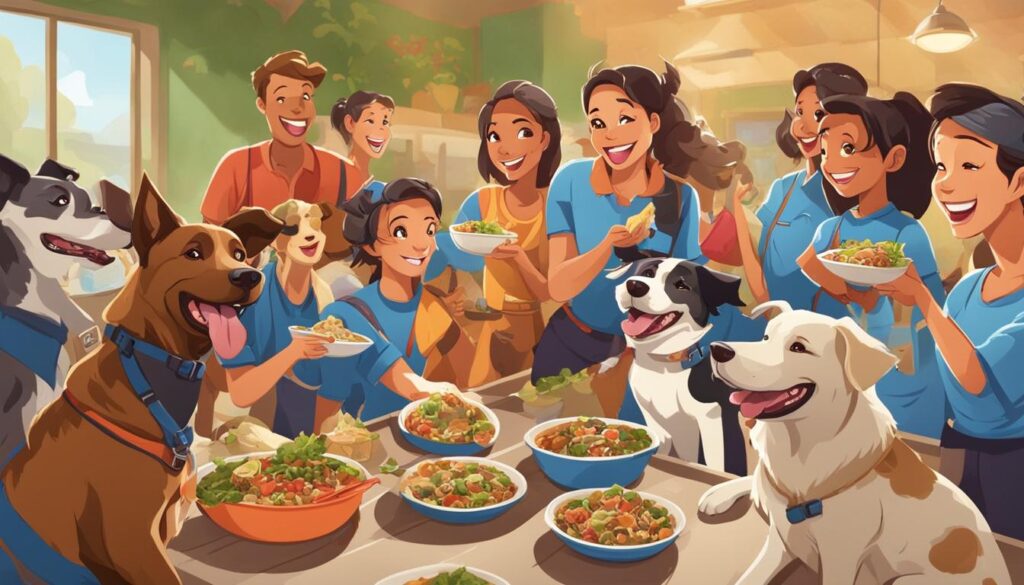

“Feeding your rescue dog a specialized diet can help address their specific health conditions and promote optimal health. It takes time and effort to establish a feeding routine that works for your furry friend, but with determination and patience, you can provide them with all the nutrients they need to thrive.”
Conclusion:
In conclusion, providing your rescue dog with a special diet that meets their dietary needs and nutritional requirements is essential for their health and well-being. By tailoring their diet, choosing the best type of food, and including balanced meals, you can ensure that your furry friend is getting the right amount of nutrients to thrive in their new forever home. Remember, consult with your veterinarian to determine the best diet for your rescue dog, especially if they have underlying health issues. With the right approach, you can help your rescue dog live a healthy and happy life.
FAQ
Why are special diets important for rescue dogs?
Special diets are important for rescue dogs because they often have unique dietary needs due to their previous lifestyles or health conditions. These diets can help address specific nutritional requirements and promote optimal health for your furry friend.
What factors should I consider when understanding the dietary needs of rescue dogs?
When understanding the dietary needs of rescue dogs, it’s important to consider factors such as their age, size, activity level, overall health, and any underlying medical conditions. These factors can affect their nutritional requirements and help determine the best diet for them.
How can I tailor the diet of my rescued dog?
Tailoring the diet of your rescued dog involves considering their specific needs, such as food allergies or sensitivities, weight management goals, or conditions like arthritis. It may require adjusting the type of food, portion sizes, or adding supplements to ensure they are getting a well-rounded and nutritious diet.
How do I choose the best diet for my rescue dog?
Choosing the best diet for your rescue dog depends on several factors, such as their age, size, breed, activity level, and any health conditions they may have. It’s important to consult with your veterinarian to determine the most suitable diet that meets their specific needs.
What should I include in a balanced meal for my rescue dog?
A balanced meal for your rescue dog should include high-quality protein sources, such as lean meats or fish, complex carbohydrates like whole grains or vegetables, healthy fats like omega-3 fatty acids, and essential vitamins and minerals. It’s important to provide a variety of nutrients to meet their nutritional needs.
Can special diets help address common health issues in rescue dogs?
Yes, special diets can help address common health issues in rescue dogs. For example, dogs with allergies may benefit from hypoallergenic diets, while those with digestive problems might benefit from easily digestible foods. Special diets can also support weight management, joint health, and other specific health conditions.
How do I implement a special diet for my rescue dog?
Implementing a special diet for your rescue dog requires a gradual transition from their current diet to the new one. Start by mixing small amounts of the new food with their current food, gradually increasing the ratio over several days. Monitor their progress and consult with your veterinarian for guidance throughout the process.
Why is it important to consult with a veterinarian for my rescue dog’s special diet?
It’s important to consult with a veterinarian for your rescue dog’s special diet because they can provide professional guidance based on your dog’s specific needs and medical history. A veterinarian can help you choose the right diet, monitor your dog’s progress, and make any necessary adjustments to ensure their dietary needs are being met.

